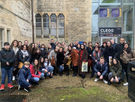I-YOUTH
Mission
The iYouth project aims to enhance the understanding of how secondary schools can foster innovation interest, skills, and capacity among young students. Through practical experimentation, the project seeks to explore effective didactics and methods that can inspire students to engage with innovation, entrepreneurial thinking, and problem-solving. Building on solid research and best practices from leading educational bodies such as the European Commission and OECD, iYouth will create an innovative and adaptable framework for schools to integrate innovation as a continuous, cross-disciplinary experience in students' educational journeys.
Challenge
Despite extensive research on fostering innovation in education, there is still a significant gap between theory and practice in secondary schools. While various guidelines and recommendations have been developed by educational organizations, many schools struggle to implement these frameworks in a way that is practical, engaging, and effective. The iYouth project addresses this gap by focusing on real-life experimentation and offering teachers and students the tools, methods, and support needed to develop a genuine interest and capacity for innovation. The challenge lies in creating an approach that is both flexible and grounded in actual classroom experiences, moving beyond theoretical frameworks to hands-on, real-time innovation activities.
Methodology
The iYouth project follows a structured yet flexible methodology built on three core elements that shape the project’s activities, implementation methods, and outcomes:
-
iYouth Conceptual Framework
This framework provides a comprehensive understanding of what innovation interest, skills, and capacity mean for young learners. Innovation engagement is not seen as a separate subject or isolated event, but as an integral part of the learning process. By combining curiosity, exploration, and creativity, the iYouth framework aims to create immersive, community-based experiences that encourage students to tackle real-world challenges. The approach emphasizes an open, interdisciplinary, and holistic view of education, where innovation spans multiple subjects and societal challenges, fostering a mindset of curiosity and desire for change. -
iYouth Generic Learning Principles
This set of principles guides how learning processes can foster innovation. The principles emphasize cross-subject collaboration, focusing on unsolved societal problems that are relevant to young people. The activities are designed to trigger curiosity and foster an adventurous, pioneering spirit, providing students with real-time, real-life challenges that demand interaction with out-of-school resources and community stakeholders. By involving students in co-creation and knowledge generation, the principles encourage continuous engagement and shared learning in both physical and virtual spaces. -
iYouth Engagement Approach
Innovation skills and capacity are not developed through classroom instruction alone. The iYouth project emphasizes the importance of continuous, long-term engagement with real-world challenges. The approach is structured around a step-by-step progression, from curiosity and interest to engagement, skills, and ultimately, the capacity to create and implement innovative solutions. Students are encouraged to work on real-life projects, interact with external experts, pitch ideas, and share solutions, all while honing their skills through collaboration and hands-on experience.
Outcomes
The iYouth project aims to produce several key outcomes that will help secondary schools integrate innovation into their curricula:
-
The iYouth Didactics Platform: A structured didactic platform that will guide schools in applying the conceptual framework, generic learning principles, and engagement approach to foster innovation among students.
-
Real-Life Innovation Projects: Practical projects and activities that students can engage in, tackling societal challenges and developing their innovation skills through co-creation and collaboration with external resources.
-
Teacher Training and Support: Teachers will be equipped with the skills to guide students in innovation-fostering activities, using the step-by-step approach to support the development of innovation interest and capacity in their classrooms.
-
Evaluation and Feedback: The project will assess the impact of its methods through continuous feedback and evaluation, ensuring that schools can adapt and refine their approach to innovation over time.
Funded by the Erasmus+ program, iYouth aims to help secondary schools across Europe create environments where students develop the mindset and skills needed to become the innovators, problem-solvers, and leaders of the future.
Project financed by: ERASMUS +






























